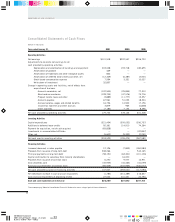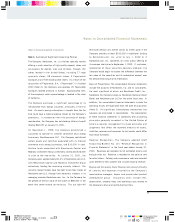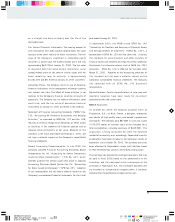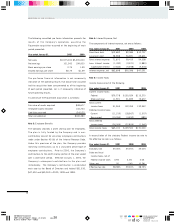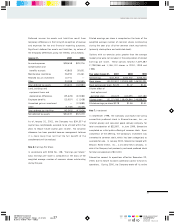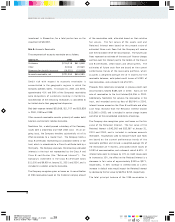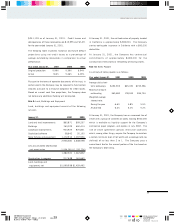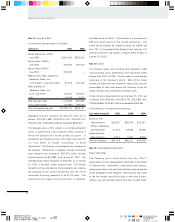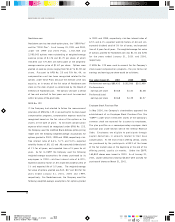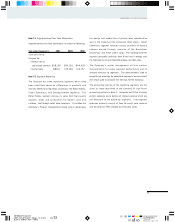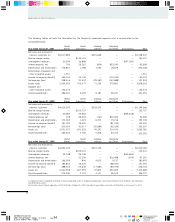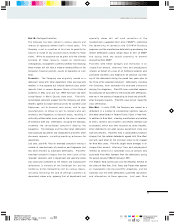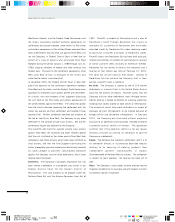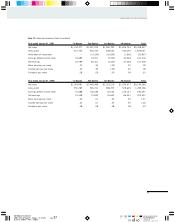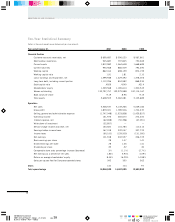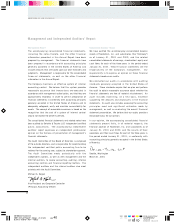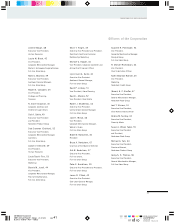Nordstrom 2000 Annual Report Download - page 34
Download and view the complete annual report
Please find page 34 of the 2000 Nordstrom annual report below. You can navigate through the pages in the report by either clicking on the pages listed below, or by using the keyword search tool below to find specific information within the annual report.
Cyan Mag Yelo Blk
20100444 Nordstrom
2001 Annual Report • 44pgs. + 4 covers pg. 32
8.375 x 10.875 • PDF • 150 lpi
PMS
5773
PMS
5503
32
NORDSTROM, INC. AND SUBSIDIARIES
Nordstrom.com
Nordstrom.com has two stock option plans, the “1999 Plan”
and the “2000 Plan”. As of January 31, 2001 and 2000,
under the 1999 and 2000 Plans, 1,767,565 and
2,590,000 options were outstanding at weighted-average
exercise prices of $1.76 and $1.70 per share; of which
300,654 and 775,500 are exercisable at the weighted-
average exercise price of $1.67 per share. Options were
granted at exercise prices ranging from $1.67 to $1.92 per
share. Pursuant to APB No. 25 and FIN No. 44, no
compensation cost has been recognized related to the
options under these Plans because the exercise price was
equal to, or in excess of the fair value of Nordstrom.com
stock on the date of grant as determined by the Board of
Directors of Nordstrom.com. The options vest over a period
of two and one-half to four years and must be exercised
within ten years of the grant date.
SFAS No. 123
If the Company had elected to follow the measurement
provisions of SFAS No. 123 in accounting for its stock-based
compensation programs, compensation expense would be
recognized based on the fair value of the options or the
shares at the date of grant. To estimate compensation
expense which would be recognized under SFAS No. 123,
the Company used the modified Black-Scholes option-pricing
model with the following weighted-average assumptions for
options granted in 2000, 1999 and 1998, respectively: risk-
free interest rates of 6.4%, 5.7% and 5.2%; expected
volatility factors of .65, .61 and .46; expected dividend yield
of 1% for all years; and expected lives of 5 years for all
years. As for its ESPP, the Company used the following
weighted-average assumptions for shares purchased by its
employees in 2000: risk-free interest rate of 6.02%;
expected volatility factor of .65; expected dividend yield of
1% and expected life of 0.5 years. The weighted-average
fair value of options granted was $12, $17 and $14 for the
years ended January 31, 2001, 2000 and 1999,
respectively. For Nordstrom.com, the Company used the
following weighted-average assumptions for options granted
in 2000 and 1999, respectively: risk-free interest rates of
6.5% and 6.1%; expected volatility factors of .64 and .61;
expected dividend yield of 0% for all years; and expected
lives of 5 years for all years. The weighted-average fair value
of options granted for Nordstrom.com was $1.04 and $.96
for the years ended January 31, 2001 and 2000,
respectively.
If SFAS No. 123 were used to account for the Company’s
stock-based compensation programs, the pro forma net
earnings and earnings per share would be as follows:
Year ended January 31, 2001 2000 1999
Pro forma net earnings $89,433 $192,936 $201,499
Pro forma basic
earnings per share $0.68 $1.40 $1.38
Pro forma diluted
earnings per share $0.68 $1.39 $1.37
Employee Stock Purchase Plan
In May 2000, the Company’s shareholders approved the
establishment of an Employee Stock Purchase Plan (the
“ESPP”) under which 3,500,000 shares of the Company’s
common stock are reserved for issuance to employees.
The plan qualifies as a noncompensatory employee stock
purchase plan under Section 423 of the Internal Revenue
Code. Employees are eligible to participate through
payroll deductions in amounts related to their base
compensation. At the end of each offering period, shares
are purchased by the participants at 85% of the lower
of the fair market value at the beginning or the end of the
offering period, usually six months. Under the ESPP,
165,842 shares were issued in 2000. As of January 31,
2001, payroll deductions totaling $2,602 were accrued for
purchase of shares on March 31, 2001.


